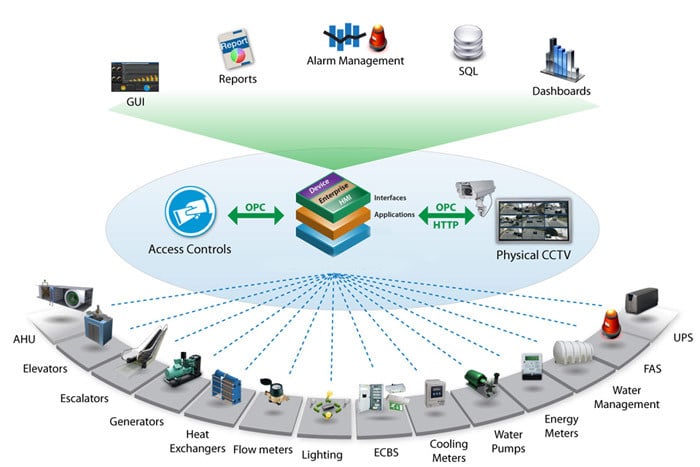Complete building management System for you. Either go end-to-end or section-wise.
Building Management System
Monitor and control all your major energy consuming appliances/systems through a next generation building management system. First, gather data to run your operations efficiently. Then, bring in automation and end-to-end control to your electrical and mechanical systems. Also, you can include fire systems, access control and security systems etc.
Electrical & Mechanical Systems
Access Control
Security Systems
Fire Systems
How it Works

Building management system (BMS) is a computer based control system. To start with, it mainly monitors and controls the electrical & mechanical equipment in an enterprise. Most importantly, such equipment or services might include power, heating, ventilation, air-conditioning, physical access control, pumping stations, elevators and lights etc. It can also expand to include fire systems, access control and security systems.
In essence, a very basic building management system consists of software, a server with a database and smart sensors. They are connected to an Internet-capable network. Smart sensors around the building gather data and send it to the BMS. Finally, a central database stores this valuable data for further analysis and action. In case, a sensor reports data that falls outside pre-defined conditions, the BMS will trigger an alarm.
Depending on the system, BMS software is either installed as a standalone application or it integrates with other monitoring programs. More advanced BMSes can monitor and manage a wide range of building services. They span across multiple platforms and protocols. Hence, this provides facility managers with a single, shared view of the facility's operations.
BMS deployments in a building or an enterprise can be of varying scale. Normally, a BMS system monitors and controls 40% to 70% of a building's energy usage. Most of all, a BMS ensures that the building operates at maximum levels of efficiency. It also minimizes energy wastage. In conclusion, a BMS continuously maintains the correct balance between various aspects of a building. They include operating requirements, external/internal environmental conditions and most noteworthy - energy usage. Thus, achieving an optimal level of efficiency.
Benefits
Increase staff productivity
Increase energy efficiency
Enhance systems reliability and life
Better preventive maintenace of major electricity guzzlers like HVAC
Save time and money by preventing breakdowns
.

Top Customers










